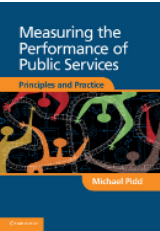

Performance measurement in public services
I became involved in this area of work as a result of a research fellowship funded by the UK's Advanced Institute of Management Research in which I looked performance measurement in public services. The fellowship gave me a great opportunity to learn about an area that was new to me and to think about how Operational Research ideas might add value.
How can people be confident that they receive high quality public services in return for their taxes? How can those who provide these services compare their performance with others and encourage a culture of continuous improvement? How can governments be sure that public services are effective, efficient and equitably provided? These are big and important questions. Modern economies rely on the public provision of important services such as education and healthcare, There is no magic formula that will guarantee high quality public services; people who claim otherwise are peddling snake oil. The day-to-day task of managing and providing public services within tight budgets is difficult, and the shifting sands of political priorities make it even harder, though it can be very satisfying. When managing and providing public services, performance measurement per se is neither good nor bad. It can be done well or poorly. It can provide useful information and support innovation and development, or it can become part of heavy-handed central control that stifles development.
Performance measurement is a vital part of any systematic attempt to continually improve public services. It is certainly not the only part, but without it, how can any stakeholders have a reasonable idea of how well these services are provided? It is a mistake to assume that measurement is only appropriate to particular forms of public management. Many have argued that it is a core element of what has become known as the New Public Management. Whether or not this is true, it does not mean that public agencies and programmes need not or should not measure their performance under other regimes. How can agencies know how well they are doing unless they attempt to find out and do so in a systematic way?
Performance measurement is often associated with performance management and with auditing. Performance measurement as part of performance management is often presented as rigid central control, complete with tick boxes and targets, based on a lack of trust between service providers and their funders. Performance measurement as auditing is often regarded as an extension to accounting, with its emphasis on the past. I think that these are only two of the reasons why sensitive attempts to measure performance are important. There is much more to performance measurement than auditing the past or heavy-handed performance management. I regard the latter as particularly inappropriate in many circumstances and discuss why I think this. Readers may or may not agree with me on this, but I hope that my book will stimulate discussion and lead to improved and appropriate performance measurement.
The book
Given the opportunity for sabbatical leave during the 2009/10 session, I decided to write a book on this. Unsurprisingly, it's called Measuring the performance of public services. It was published in 2012 by Cambridge University Press and there are also epub and Kindle versions available.
I hope it will be valuable to practicing public managers and civil servants and to students studying public administration, management and leadership.



